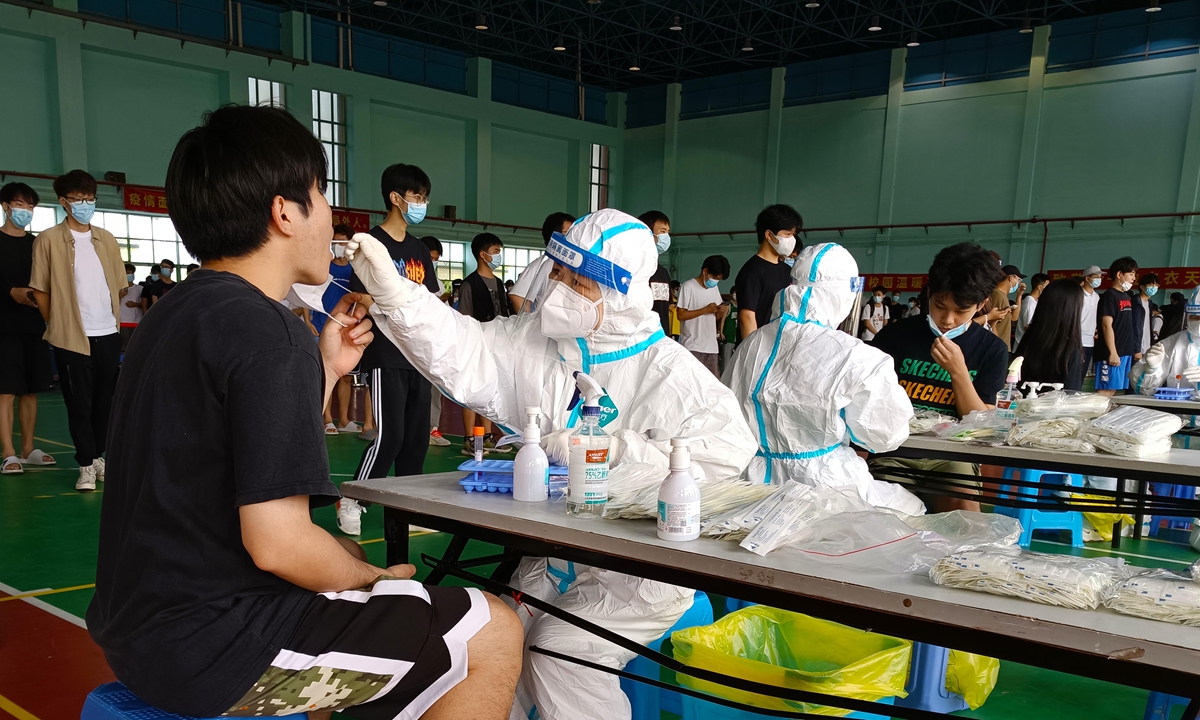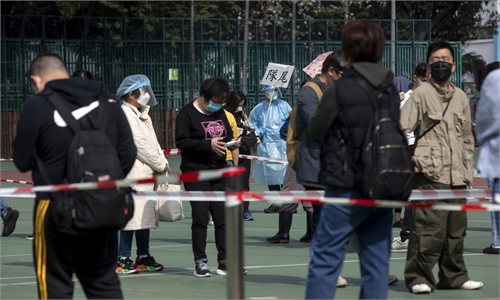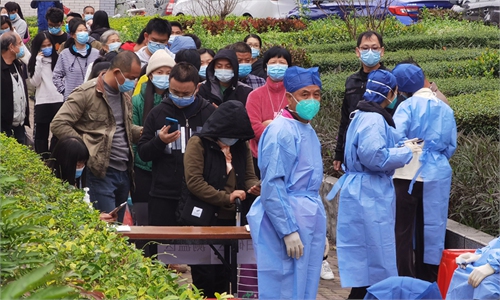
Students in Zhuhai, South China's Guangdong Province, receive nucleic acid test in April 2022. Photo: VCG
The Guangdong-Macao In-depth Cooperation Zone in Hengqin, an island located in Zhuhai in South China's Guangdong Province, announced on Monday that bus services and on-site classes will be suspended from Monday for three days, amid the COVID-19 resurgence risk in the Macao Special Administrative Region (SAR), which is adjacent to the zone.
As of 4 pm on Monday, 36 cases had been reported in the Macao SAR, according to local officials, and an epidemiological survey was in progress.
One of the cases is an employee from Zhuhai who works in the Macao SAR and travels between the two places every day. The person was confirmed positive in Zhuhai.
Zhuhai on Sunday registered three imported asymptomatic cases including two from the Macao SAR, health authorities said on Monday.
One of the positive cases lives in the Guangdong-Macao In-depth Cooperation Zone in Hengqin. The suspension management started at 9 am on Monday and will last for three days, with mass nucleic acid testing each day covering the whole zone.
During the suspension, except for vehicles and personnel holding permits for epidemic prevention and control, emergency rescue, medical treatment and support, others can only enter the zone but are not allowed to leave.
Online ride-hailing and bus services were also suspended.
Kindergartens and primary and secondary schools in the zone have suspended on-site classes, and primary and secondary schools will carry out online classes, said the notice.
Dine-in service at restaurants and other entertainment venues has been suspended. Medical institutions, shopping malls and supermarkets needed to guarantee the normal operation of supplies will work normally, and express delivery services will be available, according to the notice.
Other districts in Zhuhai started mass nucleic acid tests on Monday. Starting from Sunday, inbound personnel arriving in Zhuhai via Zhuhai-Macao ports (including Hengqin port) should show a negative nucleic acid test obtained within 24 hours, Zhuhai authorities announced on Sunday.
Lu Hongzhou, head of the Third People's Hospital of Shenzhen, told the Global Times on Monday that the imported risk from the Macao SAR will have little impact on epidemic prevention and control in Guangdong, as the province has established sound mechanisms to detect possible infections in a rapid way through prompt nucleic acid testing.
The Macao SAR started mass nucleic acid testing on Sunday. As of 4 pm on Monday, a total of 459,687 samples had been collected, of which 269,628 tested negative. In addition, nine samples (10 in 1 mixed sampling) tested preliminarily positive, and re-checking has been conducted, according to the SAR.
Since June 15, individuals entering Zhuhai from the Macao SAR have had to report to their communities, employers or hotels immediately, undergo a seven-day home quarantine (without outside activities) and another seven-day self-health monitoring at home (not going out unless necessary), Zhuhai authorities said in a notice issued on Sunday. These personnel should not go back to their workplaces or schools, or visit public venues, and they should avoid taking public transportation.
Those entering Zhuhai from medium- and high-risk zones of the Macao SAR shall undergo seven-day centralized quarantine and take a nucleic acid test each day, as well as undergo another seven-day home health quarantine with nucleic acid testing required on the 10th and 14th days, according to Zhuhai authorities.
A total of 13 people have received administrative detention for 10 days each for failing to follow the related health management regulations and going to public venues, causing the risk of the epidemic spreading, after entering Zhuhai from the Macao SAR, according to Zhuhai authorities on Monday.


